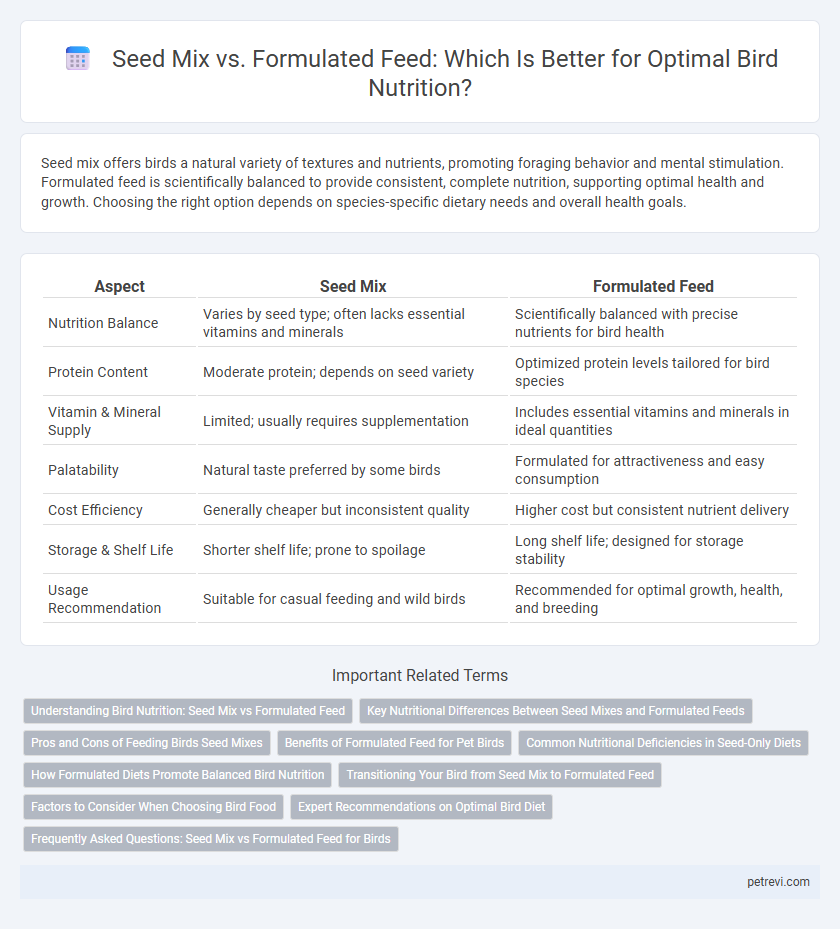Seed mix offers birds a natural variety of textures and nutrients, promoting foraging behavior and mental stimulation. Formulated feed is scientifically balanced to provide consistent, complete nutrition, supporting optimal health and growth. Choosing the right option depends on species-specific dietary needs and overall health goals.
Table of Comparison
| Aspect | Seed Mix | Formulated Feed |
|---|---|---|
| Nutrition Balance | Varies by seed type; often lacks essential vitamins and minerals | Scientifically balanced with precise nutrients for bird health |
| Protein Content | Moderate protein; depends on seed variety | Optimized protein levels tailored for bird species |
| Vitamin & Mineral Supply | Limited; usually requires supplementation | Includes essential vitamins and minerals in ideal quantities |
| Palatability | Natural taste preferred by some birds | Formulated for attractiveness and easy consumption |
| Cost Efficiency | Generally cheaper but inconsistent quality | Higher cost but consistent nutrient delivery |
| Storage & Shelf Life | Shorter shelf life; prone to spoilage | Long shelf life; designed for storage stability |
| Usage Recommendation | Suitable for casual feeding and wild birds | Recommended for optimal growth, health, and breeding |
Understanding Bird Nutrition: Seed Mix vs Formulated Feed
Bird nutrition demands a balanced intake of essential nutrients, making formulated feed superior to seed mixes due to its precise composition of vitamins, minerals, proteins, and fats. Seed mixes often lack critical micronutrients and contain high-fat seeds that can lead to obesity and nutritional imbalances in pet birds. Formulated feeds are scientifically designed to meet the specific dietary requirements of various bird species, promoting optimal health and longevity.
Key Nutritional Differences Between Seed Mixes and Formulated Feeds
Seed mixes provide natural sources of fiber, fats, and essential fatty acids, but often lack consistent levels of vitamins and minerals crucial for bird health. Formulated feeds are designed to deliver balanced nutrition with precise concentrations of proteins, vitamins (such as A, D3, E), and minerals (like calcium and phosphorus) tailored to species-specific dietary requirements. The key nutritional difference lies in the uniformity and completeness of nutrients in formulated feeds compared to the variability and potential nutrient gaps in seed mixes.
Pros and Cons of Feeding Birds Seed Mixes
Seed mixes provide a natural foraging experience and variety of nutrients that many bird species enjoy, promoting mental stimulation and beak health. However, seed mixes can be high in fat and lack essential vitamins and minerals, potentially leading to nutritional imbalances and obesity in captive birds. Selecting high-quality, diverse seed blends and supplementing with formulated feeds ensures a more balanced diet and supports overall bird health.
Benefits of Formulated Feed for Pet Birds
Formulated feed for pet birds offers balanced nutrition with precise ratios of proteins, vitamins, and minerals essential for optimal health and vibrant plumage. Unlike seed mixes, formulated diets reduce the risk of selective eating and nutritional deficiencies by providing consistent nutrient content. This tailored approach enhances immune function and supports overall well-being in diverse bird species.
Common Nutritional Deficiencies in Seed-Only Diets
Seed-only diets often lack essential nutrients such as calcium, vitamin A, and omega-3 fatty acids, leading to common deficiencies in birds. These nutritional gaps can result in weakened immune systems, poor feather quality, and developmental issues. Formulated feeds provide a balanced spectrum of vitamins, minerals, and proteins designed to prevent such deficiencies and support overall avian health.
How Formulated Diets Promote Balanced Bird Nutrition
Formulated diets for birds provide a precisely balanced combination of essential nutrients, including proteins, vitamins, and minerals, tailored to specific species and life stages, ensuring optimal health and development. Unlike seed mixes, which can be deficient in critical nutrients and lead to selective feeding habits, formulated feeds prevent nutritional imbalances and related health issues such as vitamin A deficiency and obesity. Research shows that birds on formulated diets exhibit improved immune function, feather quality, and longevity compared to those relying solely on seed-based nutrition.
Transitioning Your Bird from Seed Mix to Formulated Feed
Transitioning your bird from a seed mix to formulated feed enhances nutritional balance by providing essential vitamins, minerals, and protein tailored to avian health. Formulated feeds reduce the risk of deficiencies common in seed-only diets, supporting optimal feather quality, immune function, and overall vitality. Gradual introduction of formulated pellets alongside seeds encourages acceptance while minimizing stress and digestive issues during the dietary change.
Factors to Consider When Choosing Bird Food
Choosing the right bird food depends on factors such as nutritional content, species-specific dietary needs, and ease of digestion. Seed mixes offer natural variety but may lack balanced nutrients, while formulated feeds provide precise nutrient profiles tailored to bird species. Consider bird age, health status, and feeding habits to ensure optimal growth and wellbeing.
Expert Recommendations on Optimal Bird Diet
Experts recommend formulated feed over seed mix for optimal bird nutrition due to its balanced composition of essential vitamins, minerals, and proteins tailored to specific bird species. Seed mixes often lack critical nutrients and can lead to deficiencies, whereas formulated feeds ensure consistent nutrient intake, promoting better health and longevity. For aviary birds and pet birds, using scientifically developed pellets or formulated diets supports immune function, feather quality, and overall vitality more effectively than traditional seed-based diets.
Frequently Asked Questions: Seed Mix vs Formulated Feed for Birds
Seed mix offers natural variety and is preferred by many bird enthusiasts for mimicking wild diets, but it may lack balanced nutrition and can lead to selective feeding. Formulated feed is scientifically designed to provide complete, balanced nutrients, ensuring optimal health, growth, and feather quality in birds. Choosing between seed mix and formulated feed depends on species-specific dietary requirements and the need for nutritional completeness versus natural foraging behaviors.
Seed mix vs Formulated feed for Bird nutrition Infographic

 petrevi.com
petrevi.com